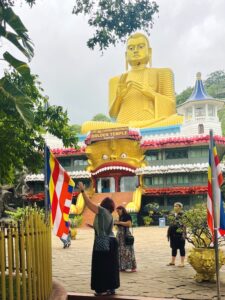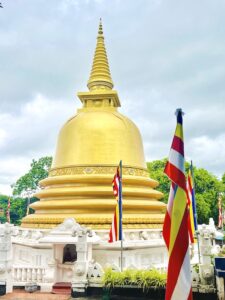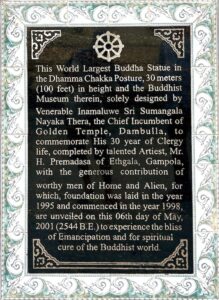During my recent trip to Sri Lanka with Asian Itinerary, I had the privilege of visiting the famous Golden Buddha in Dambulla—a striking symbol of faith and artistry that stands as a beacon of spirituality at the foot of the sacred hill. Even on a day clouded with persistent rain, this magnificent statue radiated serenity, inviting pilgrims and travelers alike to pause and reflect.
The Significance of the Golden Buddha
 Perched at the base of the Dambulla rock, the large golden Buddha statue is more than just a striking piece of art; it embodies centuries of Buddhist devotion in Sri Lanka. It is believed to have been constructed during the late 20th century, as part of efforts to rejuvenate religious sites and promote Buddhist heritage. The statue’s gleaming golden exterior symbolizes enlightenment, peace, and the spiritual journey that Sri Lanka’s people have cherished for generations.
Perched at the base of the Dambulla rock, the large golden Buddha statue is more than just a striking piece of art; it embodies centuries of Buddhist devotion in Sri Lanka. It is believed to have been constructed during the late 20th century, as part of efforts to rejuvenate religious sites and promote Buddhist heritage. The statue’s gleaming golden exterior symbolizes enlightenment, peace, and the spiritual journey that Sri Lanka’s people have cherished for generations.
This iconic statue is not only a religious symbol but also a cultural landmark, often seen in photographs and postcards representing Dambulla. It is a focal point for pilgrims, who come here to pay homage and seek blessings, while travelers are drawn to its impressive size and tranquil presence.
The Experience of Visiting the Golden Buddha
 Approaching the Buddha statue is a memorable experience. The statue is approximately 15 meters tall, seated in a meditative posture, with a gentle smile reflecting inner peace. Its gilded surface catches the subdued light beautifully, especially on a cloudy day, creating a luminous aura that feels almost otherworldly.
Approaching the Buddha statue is a memorable experience. The statue is approximately 15 meters tall, seated in a meditative posture, with a gentle smile reflecting inner peace. Its gilded surface catches the subdued light beautifully, especially on a cloudy day, creating a luminous aura that feels almost otherworldly.
On the day I visited, the weather was overcast, and rain was coming and going—a typical pattern in Sri Lanka’s monsoon season. Despite the gloom, the golden hue of the statue shone brightly, and the atmosphere was filled with a sense of devotion. Devotees and monks were seen lighting incense sticks and walking around the statue, engaging in prayer and meditation.
Cultural and Spiritual Significance
 The golden Buddha at Dambulla is more than an impressive sight; it is a living symbol of Sri Lanka’s deep-rooted Buddhist traditions. The act of lighting incense and offering prayers is a common practice here, and I observed many pilgrims doing so, finding solace in their rituals. The statue is also a reminder of the teachings of Buddha—compassion, mindfulness, and the pursuit of enlightenment.
The golden Buddha at Dambulla is more than an impressive sight; it is a living symbol of Sri Lanka’s deep-rooted Buddhist traditions. The act of lighting incense and offering prayers is a common practice here, and I observed many pilgrims doing so, finding solace in their rituals. The statue is also a reminder of the teachings of Buddha—compassion, mindfulness, and the pursuit of enlightenment.
Additionally, the location at the bottom of the hill makes it a perfect starting point for visitors heading to explore the ancient cave temples above. Many travelers pause here first to soak in the spiritual atmosphere before embarking on their ascent.
Tips for Visiting the Golden Buddha
Best time to visit: Early morning or late afternoon when the light is softer, and the site is less crowded.
Respectful attire: Modest clothing covering shoulders and knees is appreciated, as it’s a sacred site.
Photography: Feel free to take photos of the statue, but always be respectful of pilgrims and monks during prayer time.
Weather considerations: The area can be slippery after rain, so wear sturdy shoes and be cautious.
Combine with the hilltop visit: After paying respects at the Buddha, consider climbing the hill to visit the cave temples for a full cultural experience.
Personal Impressions
 My visit to the Golden Buddha at Dambulla left a lasting impression. The rain had been relentless for days, but the sight of this luminous statue made me pause and take a moment of reflection. Seeing devotees lighting incense and walking around with reverence, I felt a deep connection to the spiritual heartbeat of Sri Lanka. The peaceful aura and the majestic presence of the Buddha created a sense of tranquility, even amid the grey clouds. It truly exemplifies how faith and art intertwine in Sri Lanka’s cultural fabric.
My visit to the Golden Buddha at Dambulla left a lasting impression. The rain had been relentless for days, but the sight of this luminous statue made me pause and take a moment of reflection. Seeing devotees lighting incense and walking around with reverence, I felt a deep connection to the spiritual heartbeat of Sri Lanka. The peaceful aura and the majestic presence of the Buddha created a sense of tranquility, even amid the grey clouds. It truly exemplifies how faith and art intertwine in Sri Lanka’s cultural fabric.
From its commanding position at the foot of the hill to its gleaming surface, the Golden Buddha is a must-see for anyone exploring Dambulla, whether for spiritual reasons or simply to admire Sri Lanka’s artistic heritage.
Why Visit the Golden Buddha?
 This iconic statue is a powerful symbol of peace and faith in Sri Lanka. It offers a compelling glimpse into the island’s religious life and provides a serene setting for contemplation. Whether you’re a spiritual seeker, a photographer, or a history enthusiast, the Golden Buddha at Dambulla deserves a spot on your travel itinerary.
This iconic statue is a powerful symbol of peace and faith in Sri Lanka. It offers a compelling glimpse into the island’s religious life and provides a serene setting for contemplation. Whether you’re a spiritual seeker, a photographer, or a history enthusiast, the Golden Buddha at Dambulla deserves a spot on your travel itinerary.
Final Thoughts
My experience visiting the Dambulla Golden Buddha was a highlight of my Sri Lankan journey. The blend of spiritual ambiance, cultural history, and scenic beauty makes it a truly special destination. If you’re traveling through Sri Lanka’s Cultural Triangle, make sure to stop here—let the golden glow remind you of the enduring spirit of this beautiful island.
For more insights into Sri Lanka’s rich heritage and must-visit sites, stay tuned to Asian Itinerary. The Golden Buddha at Dambulla is a shining example of the island’s spiritual and artistic treasures.
CHECK UP OUR PHOTO-GALLERY HERE
Sundaras Resort & SPA
 Asian Itinerary team stay was kindly hosted by Sundaras Resort & SPA. The Resort is in Dambulla and offers family rooms with air-conditioning, private bathrooms, and garden views. Each room includes a work desk, dining area, and free WiFi.
Asian Itinerary team stay was kindly hosted by Sundaras Resort & SPA. The Resort is in Dambulla and offers family rooms with air-conditioning, private bathrooms, and garden views. Each room includes a work desk, dining area, and free WiFi.
Visit their FACEBOOK page HERE.
Metro Tours & Rent A Car
Asian Itinerary explored Sri Lanka by car, courtesy of Metro Tours & Rent A Car, proudly serving travelers across the island since 2005. With over 20 years of experience and a 4.9-star rating from 220+ Google reviews, they are a trusted name in car rentals, known for quality service and customer satisfaction.
WEBSITE: https://metrotours.lk/
EMAIL: metrotoursrentacar@gmail.com
WHATSAPP: +94 777327285


